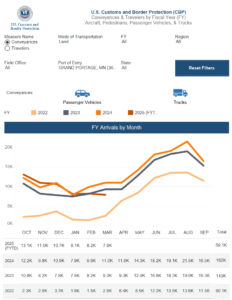Ryden’s Border Store impacted by tariffs and decline in Canadian visitors
Once a steady flow across the northern border, the decline in Canadian visitors has become noticeably evident for businesses near the Pigeon River Port of Entry in Grand Portage.
The reduction of Canadian visitors, largely due to the weakening of the Canadian dollar and tariffs, is forcing the third-generation owners of the family-run Ryden’s Gas Station and Ryden’s Border Store to make some difficult business decisions.
Ryden’s Gas Station and Ryden’s Border Store are two independently owned and operated family businesses, with siblings Debbie Bakke and Mike Ryden running Ryden’s Gas Station and cousin Lori “Sam” Boomer and her husband, Mike Boomer, operating Ryden’s Border Store.
Although the two businesses are independently owned, the third-generation owners step in where needed to provide mutual assistance with business operations.
With the reduction of Canadian visitors, Bakke said, “We’ve had to cut back a bit on employee hours and no overtime.”
Furthermore, the two businesses have had to trim owner’s wages and tighten the belt on business expenses.
Given its proximity to the border, Ryden’s Border Store and Gas Station rely heavily on Canadian visitors as a core part of their business, particularly in the slower winter months.
Ryden’s Border Store offers duty-free beer and liquor, money exchange, and parcel services. The store also sells items like jerky and souvenirs. Canadian residents will often travel across the border for shopping, extended trips, or stop at Ryden’s to pick up packages and purchase duty-free goods.
“Canadian traffic is probably about 90% of our business in the off-season,” Bakke said.
Bakke said the frequency and number of Canadian visitors have declined in recent months, a trend that became especially noticeable in April.
“We started to see more of a decline in February and March and then April has really fallen off,” Bakke said.
Earlier in the winter, the owners of Ryden’s suspected the reduction in Canadian visitors was largely due to the weakening of the Canadian dollar, which has been ongoing since late 2024.
However, with U.S. tariffs taking effect in February and then Canada’s reciprocal tariffs in March, Bakke said the tariffs are now driving the reduction of Canadian visitors.
“The tariffs are definitely affecting us,” Bakke said.
President Donald Trump implemented a 25% tariff on imports from Canada on Feb. 1. A month later, on March 4, the Canadian government imposed 25% tariffs on the import of select goods from the United States.
According to the Canada Border Services Agency, returning residents and visitors are expected to pay applicable tariffs, customs duties, and taxes on goods upon entry into Canada. All goods originating from the U.S. are subject to the tariffs, while goods originating from another country but purchased in the U.S. are not subject to tariffs. In addition, goods imported into Canada by mail or courier may also be subject to tariffs.
Since the tariffs were enacted, Bakke said Ryden’s has been fielding questions about how they are implemented and trying their best to answer them. “Mostly, I think people don’t understand just what to expect from the tariffs. We don’t even understand them, so we don’t know how to answer their questions.”
Ryden’s Border Store is not the only business facing challenges brought on by the tariffs. Similar small businesses near the Canada-U.S. border are also struggling to adapt to the reduction of Canadian visitors due to the tariffs.
The Canadian Broadcasting Corporation (CBC) reported on April 20 that Halfway House Freight Forwarding, a family-run parcel pick-up business located on the border of Dundee, Que., and Fort Covington, N.Y., has also seen a reduction of Canadian customers since the implementation of tariffs.
Bakke said the recent reduction of Canadian visitors feels eerily similar to the COVID-19 pandemic.
“It’s feeling like COVID all over again,” she said.
Although the Canada-U.S. border has been open for a couple of years since the COVID-19 closures, Ryden’s Border Store is still dealing with the pandemic’s lasting effects on the business.
“We haven’t completely recovered from COVID yet. So this isn’t helping,” Bakke said.
In an interview with WTIP in June 2024, Bakke and her brother Mike Ryden said at the start of the 2024 summer, “We’re slowly getting back. We’re still not back full-bore.” In June 2024, he said the business was at 65 percent of its pre-pandemic level.
The U.S. Customs and Border Protection (CBP) data for the Pigeon River Port of Entry in Grand Portage shows that since January 2025, the number of travelers from Canada has been trending downward.
When comparing the January-March numbers for 2023 and 2024, the trend shows a steady increase as spring and summer ramp up. The final April numbers will be available in early May.
The impact of the Trump administration’s tariffs and ongoing political tensions will likely cause international travel to the U.S. to fall even further than expected this year, according to an April 1 report from Tourism Economics, a travel forecasting company.
Tourism Economics expects the number of people arriving in the U.S. from abroad to decline by 9.4% this year, led by a 20.2% decline in visitation from Canada.
While Ryden’s and other similar border businesses are struggling to navigate the tariff landscape right now and the reduction of Canadian visitors, Bakke said one of the most important things is the loss of relationships.
“We truly miss our Canadian customers,” she said.
“I just hope we can get over all of this soon and get back to some kind of normalcy,” Bakke said. “I will still go to Canada, and I hope we can continue to have a good relationship with our northern neighbors.”















